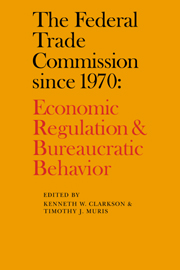Book contents
- Frontmatter
- Contents
- List of contributors
- Preface
- 1 Introduction
- Part I The institutional setting
- Part II Nature and consequence of FTC actions
- Introduction
- 6 Bureau of Competition: antitrust enforcement activities
- 7 Information for antitrust and business activity: line-of-business reporting
- 8 Industry structure investigations: Xerox's multiple patents and competition
- 9 Exclusionary practices: shopping center restrictive covenants
- 10 Legislative powers: FTC rule making
- 11 Rewriting consumer contracts: creditors' remedies
- 12 Regulating postpurchase relations: mobile homes
- 13 Regulating information: advertising overview
- 14 Special statutes: the structure and operation of the Magnuson-Moss Warranty Act
- Part III Conclusions and reforms
- Notes
- Selected bibliography
- Index
8 - Industry structure investigations: Xerox's multiple patents and competition
Published online by Cambridge University Press: 05 November 2011
- Frontmatter
- Contents
- List of contributors
- Preface
- 1 Introduction
- Part I The institutional setting
- Part II Nature and consequence of FTC actions
- Introduction
- 6 Bureau of Competition: antitrust enforcement activities
- 7 Information for antitrust and business activity: line-of-business reporting
- 8 Industry structure investigations: Xerox's multiple patents and competition
- 9 Exclusionary practices: shopping center restrictive covenants
- 10 Legislative powers: FTC rule making
- 11 Rewriting consumer contracts: creditors' remedies
- 12 Regulating postpurchase relations: mobile homes
- 13 Regulating information: advertising overview
- 14 Special statutes: the structure and operation of the Magnuson-Moss Warranty Act
- Part III Conclusions and reforms
- Notes
- Selected bibliography
- Index
Summary
This chapter evaluates the FTC's proceeding against Xerox Corporation, the firm that revolutionized the copying industry and continues as its most important member. We focus on charges that Xerox, through various means, accumulated patents covering the technology for office copying (or at least its plain-paper submarket) that were so extensive, complex, and obscure in their overall scope that effective competition in the industry was eliminated. The proceeding was terminated by a consent order imposing extensive requirements on Xerox, including a mandate to license any three patents without charge and all patents on terms specified in the order.
Although the FTC's complaint does contain other allegations about the marketing practices of Xerox and its territorial divisions with foreign affiliates, the contention that lends unique importance to this proceeding is that of domination of the industry by control of the essential patented technology. The desirability of the FTC's leveling this charge and resolving it through this consent order can be assessed only by making difficult and far-reaching judgments concerning the proper reconciliation of the ends underlying the patent laws with those served by the antitrust laws.
The basic conflict between these laws has long been well understood. To encourage invention, the patent laws confer a monopoly and therefore the power to choose a price–quantity combination as any monopolist would, with the attendant undesirable allocative and distributional consequences. The central aim of the antitrust laws is to avoid these very consequences.
- Type
- Chapter
- Information
- The Federal Trade Commission since 1970Economic Regulation and Bureaucratic Behavior, pp. 121 - 140Publisher: Cambridge University PressPrint publication year: 1981



